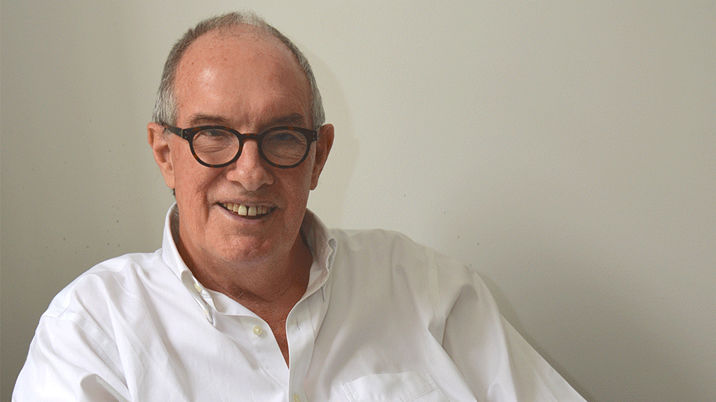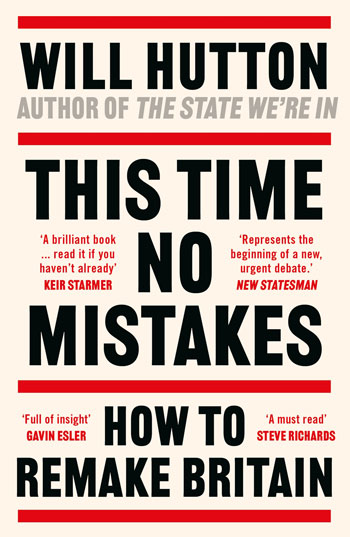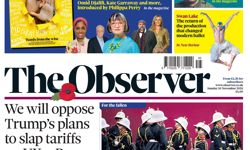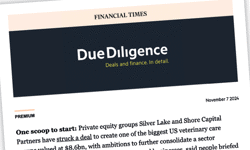
The Observer columnist, Will Hutton, has been campaigning for more rational and inclusive forms of government in the UK for nearly three decades — all the way back to his bestseller, ‘The State We Are In’, published 28 years ago.
The deal on what he advocates has yet to be done, and in April with a tone approaching exasperation, Hutton, a former editor-in-chief of The Observer, published the latest in what has been a series of discrete books with an underlying theme: This Time No Mistakes: How To Remake Britain.
This time, the omens seemed more promising for Hutton, a moderate left-of-centre social liberal who emphasises the importance of fellowship and the ‘we’ rather than the selfish ‘me’.
His new agenda for a better Britain was published less than three months before Sir Keir Starmer won power with a large majority after 14 years in the political wilderness.
Sir Keir, while leader of the opposition, attended the book launch, insisted he had read it all and, according to Hutton, the coming prime minister told him it was “brilliant”.
So, what did Hutton make of the first 100 days of a Labour government which might be sympathetic to some of his ideas for reshaping British society?
The response in his column was, in all the circumstances, surprising.
The underlying argument of the book was that the government must escape the serial mistakes of the past 45 years of trying to shrink the state and promote a self-organising market. The state, he believes, does not crowd out business. Public investment “crowds it in”.
The Hutton hope was that a newly elected Labour government, especially if it won by a landslide, as it did, would take action.
“But after making more mistakes in its first 100 days than any postwar government, the title of the book sounds like a cry into the void,” Hutton conceded.
Where are all the ideas?
He went further and accused Sir Keir of presiding over “a managerial party” focusing on delivery rather than ideas, a mistake he believes was not made by former Labour leaders from Clement Atlee to Harold Wilson and Tony Blair.
“Ideas are the lifeblood of politics. Without a philosophy, the politician blows in the wind and has no definition,” Hutton wrote.
Talking about the first 100 days, Hutton admits most of the mistakes were second order such as freebie tickets and suits but they added up.
“As one insider told me — it’s been a sub-optimal first 100 days,” says Hutton who adds that Sir Keir should be talking about both a social floor and a more vigorous economy and that amid scarce resources, the real priority should be to alleviate child poverty.
“They don’t think, and one reason why they didn’t think is that they are not grounding their thinking in social floor and ladders,” argues the former Observer editor.
But hasn’t Chancellor Rachael Reeves followed some of his policy proposals?
“I can’t pretend for a moment they are rolling the maxims in the book,” Hutton admits but he does note the chancellor is borrowing to fund public sector liabilities and guaranteeing commercial bank lending for public projects, moves that Will Hutton has been arguing for.
Career in journalism
But how did Hutton, a deep thinker about the state of society, become a journalist?
In his case, it was a long and less than obvious path triggered by an influential individual.
Hutton was a stockbroker for six years after university but found the analysing and buying and selling of pre-existing assets had nothing to do with wealth generation.
“I was good at it but I didn’t want to spend the next 40 or 50 years doing it,” says Hutton who took himself off to INSEAD, the top management school, to do an MBA.
If you are lucky, Hutton suggests, you meet someone who is inspirational and points to a different way forward. In his case, it was an INSEAD history professor, Jonathan Storey.
Storey noted Hutton’s passion for “doing capitalism in a different way” and suggested he should become a journalist.
His professional expertise led to a producer slot on BBC Radio’s Financial World Tonight, then The Money Programme before five years as Newsnight’s economics correspondent.
He is not happy with what the BBC has now done to the programme, recently getting rid of most of its team of journalists.
“Victoria Derbyshire and Nicholas Watt do their best but sometimes the quality of the quests is not great and you ask yourself, why am I watching this,” says Hutton who after the BBC became economics correspondent of The Guardian.
It was in 1988 that he was appointed editor of The Observer and a director of Guardian National Newspapers.
“I did like being editor of The Observer,” says Hutton who adds that his four-year editorship coincided with the kicking in of the long downward trend in newspaper circulations. On the weekend before and after the 1997 general election, circulation soared to more than 700,000 before immediately after regressing to where it had been before.
He remembers most fondly commissioning expensive opinion polls in 50 marginal constituencies pinpointing where people should be able to vote tactically, a manoeuvre that was very visible in this year’s general election.
Hutton believes that Sir Keir effectively gave the Liberal Democrats a free ride in around 80 seats.
“For the first time, the Labour Party held its nose and there were seats where there was no effective campaigning and activists were re-directed to adjacent seats,” says Hutton who believes that political maturity under the current electoral system means sometimes going for your second best choice.
After leaving the Observer editorship by agreement, Hutton was off to a different life to run organisations such as The Industrial Society which became The Work Foundation, but he never entirely left journalism. For the past 15 years, he has written a weekly column first for The Guardian and then The Observer.
The future of The Observer
His ties with The Observer give him an influential voice in the current debate over its future ownership following the approach by James Harding’s Tortoise Media and the Guardian Media Group’s apparent willingness to sell.
Hutton believes The Observer has been neglected by GMG, and the Scott Trust which ultimately controls the titles. When the Sunday was bought, it was meant to be “in perpetuity” and that it would be within the citadel of the group, although there may have been an understanding that The Guardian was in “an inner citadel”.
Hutton is sceptical that a disposal is really financially necessary because the organisation has a reserve fund of £1.3 billion and that there are resources to fund both titles.
The decision to sell, he believes, has to be based on whether you push ahead to create a digital Guardian brand and end up neglecting a liberal Sunday in your own backyard.
“I think you have to do both actually and I think there are resources to do both and Guardian and Observer journalists think that very strongly,” says columnist Hutton.
Hutton does concede that there is an argument that it would be good to build the Tortoise brand with The Observer as another pole — an overall boost for liberal journalism in Britain.
However, Hutton believes strongly that just walking away from the Observer and handing it over to Tortoise Media “would be a repudiation of the original intent (of the purchase) and a repudiation of trying to make a success of this paper you have owned for 30 years.”
If it is to be sold, Hutton is adamant that it should take the form of a partnership with Tortoise, with the Guardian and the Scott Trust holding a minority stake with perhaps five to ten per cent owned by readers.
“It could be that a partnership with Tortoise could be the alchemy that gets the Observer moving,” Hutton suggests.
An imbalanced media landscape
In the broader media landscape, Hutton’s main preoccupation is to do something about what he calls “the degraded public square” where democracy is supposed to function.
Instead, there is a BBC which is not just under increasing political pressure but financial pressure too, as its finances have been squeezed, with licence fee revenue down 19 per cent in real terms. That was before additional financials responsibilities were imposed such as having to offer free licence fees for the over 75s and funding the World Service.
At a time when the written press is under increasing financial pressure and struggling to find an economic model for the transition from analogue to digital, “the BBC licence fee is more important not less”.
He if very critical of the right-wing press from the Daily Mail to the Daily Telegraph which have usually been “cheerleaders” for what he sees as the many disasters of the past 40 years — ranging from Big Bang deregulation of the City of London and austerity to Brexit and the Liz Truss budget.
Brexit, Hutton believes, would have been impossible without the Daily Mail “banging the drum” about the threat from immigration with the support of The Sun, the Daily Express and the Daily Telegraph.
To try to counter the right-wing imbalance in the press, Hutton would like to see the introduction of a residency requirement for being able to hold majority stakes in the British media.
To tackle the likes of Apple, Facebook and Google “taking our content” and creaming off the advertising, the former Observer editor would like to see the UK develop, or threaten to develop, its own public digital platform.
As his battle for a more responsible media continues, what next for Will Hutton?
First, three large papers for The Purposeful Company, an organisation he co-chairs, on how to turn the “fantastic” start-up companies being created by young Britons into “consequential companies of tomorrow”.
After that, another Hutton book?
“And after that, I don’t know. I think the world has probably had enough of Will Hutton,” he replies.
Unlikely, because there is still a long way to go to create a more democratic public square and fulfil dreams of fellowship of the ‘we’ instead of the selfishness of the ‘me’, particularly in the new age of President Donald J Trump.

This Time No Mistakes: How to Remake Britain, by Will Hutton, was published by Head of Zeus in April 2024.
This article was first published in InPublishing magazine. If you would like to be added to the free mailing list to receive the magazine, please register here.












